I’m thrilled to announce that the e-book of Crossing the Tamar is due out on Monday – it’s one of my favourite Elizabeth Hawksley novels – and it did well. Not only was it reprinted, it went into large print both in the States and in the UK, and was translated into German as Jenseits des Stromes by Wunderlich Taschenbuch. I was also invited to talk on Radio Cornwall about it; I had to go to BBC Broadcasting House (exciting!) where I was ushered into what looked like the cockpit of a space rocket – (scary – it was full of knobs and buttons which I didn’t dare touch) – and eventually a voice from someone in Cornwall came over the air waves (this was in 1998) to interview me.
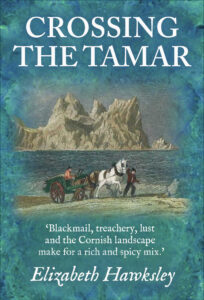
E-book cover for ‘Crossing the Tamar’ by Elizabeth Hawksley
The story’s background. What also made Crossing the Tamar special for me was that it gave me a great excuse to go and stay with various Cornish relations and do some research. My Aunt Maggie, who’d acted with the left-wing Unity Theatre in the 1930s drove me to The King’s Arms, the old coaching inn at Torpoint, which is where my hero Veryan spent his first night in Cornwall. The landlord, Ian Martin, was most welcoming and showed us the old coaching stables where I counted at least a dozen horse boxes, and I discovered that, in 1808, the landlady was called Mrs Hooper – which is always satisfying for a writer – even if you are the only person who knows it’s accurate!
Maggie lived in the old Harbour Master’s cottage in a tiny fishing village near Port Isaac and she helped me in many ways. Thanks to her Unity Theatre training, she was good at accents and she made sure that I got the Cornish accent right. She herself had come to Cornwall in 1947, where she became friends with the elderly Mrs Bullmore who spoke ‘proper Cornish’, as Maggie put it (she must have grown up in the late 19th century) and Maggie checked my dialogue against hers. And, one May, Maggie and I went for a walk in a wood full of bluebells, red campion and wild garlic, and that, too, found its way into my book:

Bluebell wood
‘For the first time, Veryan began to feel cautiously content. He sniffed the air appreciatively. It smelled of earth and bluebells and the occasional tang of wild garlic’.
I also stayed with another aunt at a cottage in Port Quin – just along the coast. – during a storm.
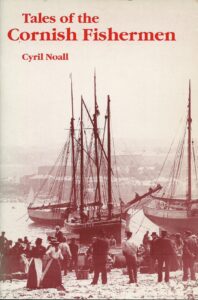
Tales of the Cornish Fishermen by Cyril Noall.
‘The waters crashed into the chasm below them; there was a dull boom underneath their feet as the wall of water hit the back of the cave and a spout of water shot up into the air through a vent as if it were boiling.’
It was a terrifying – and exhilarating, experience. About a hundred years earlier, the entire fishing fleet on Port Quin had perished during a similar storm. I learnt a lot from Cyril Noall’s book above, and from talking to Bernard Baker, an old fisherman friend of Maggie’s.
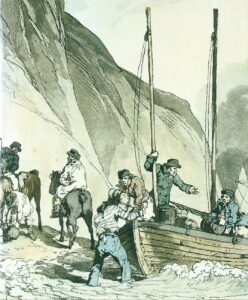
Cornish Smugglers: unloading speedily was essential
Creating the hero.
One of the most challenging things about writing Crossing the Tamar was creating the hero: the Reverend Veryan Selwood, a don at New College, Oxford, whose entire life revolves around translating Ancient Greek poems into meticulous English. He’s uptight, a prig, censorious about marital irregularities, and probably still a virgin.
‘Veryan’s experience with the fair sex was limited to a few embarrassingly inept episodes he preferred not to think about.’
From that description, I think you’ll agree that Veryan is definitely not hero material! Most heroes are sexually experienced and they get it right. So, if I wanted Veryan as my hero, I had to find a way of getting the readers on his side.
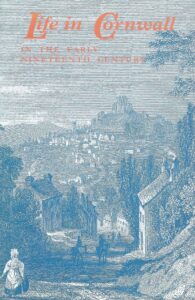
Life in Cornwall in the Early Nineteenth Century: extracts from the West Briton Newspaper. Oxford, it’s not! But it gives a fascinating glimpse into everyday life in Cornwall at the time
So I gave him a rotten childhood; ‘Mr Selwood thought his son a milksop, a mother’s boy, who should be whipped soundly and toughened up if he were ever to grow up into something his father recognized as a man. He deliberately kills Veryan’s pet rabbit. And his mother cannot help him; she, poor lady is an invalid and terrified of her husband.
But a completely bleak childhood with nobody to love or be loved by, creates a serious problem. If you leave your hero with nobody to love him and be on his side, then what you have is a character who, in real life, would be so psychologically damaged that he would be incapable of forming an adult loving relationship with anyone – let alone the heroine, Dorothea, who, of course, will have her own problems.
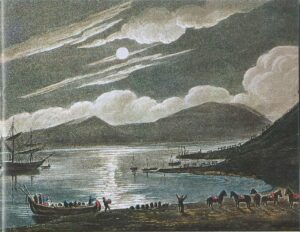
Moonlight landing: this picture also illustrates the emotional darkness from which my hero must emerge.
Veryan had to have somebody in his childhood to act as a loving parent – if he was to be a three-dimensional character; and, after some thought, I gave him a kind, sensible and loving nurse, Matty. It was she ‘who had given him love and support; she had encouraged his love of learning, had comforted him when he was ill, and did her best to shelter him from his father’s wrath.’
In her last letter to him (she died when he was fifteen) she had written: ‘Use your brains, Master Veryan. That is your way out.’
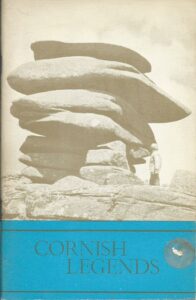
Cornish Legends: tales of headless horsemen etc. were told to strangers to discourage them from venturing out after dark
So what does Veryan looks like? Initially, he is a ‘tall, very thin man (he often forgot to eat), who stooped. His fair hair flopped untidily over his collar and his blue-grey eyes peered out at the world from behind metal-rimmed spectacles.’ Hm. That won’t do.
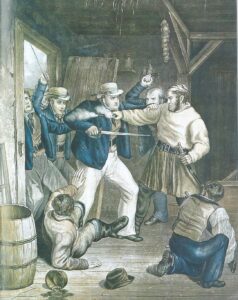
Smugglers attacked : can Veryan, too, come good?
But things change, as Veryan sets out to learn about the new estate he has inherited. More walking and riding in the fresh air, means that ‘his muscles develop, his skin has a healthier tinge of colour and his hair thickens up.’ He also treads on his spectacles (which were supposed to be ‘reading’ spectacles only) and gradually his sight improves.
Slowly, the reader comes to realize that, now Veryan no longer stoops, stops stumbling over things, and with a new hair cut, he is a handsome man. Furthermore, his inhibitions – like not wanting to be touched, fade away. Little Jenny Tregair, who needs a crutch, is ‘fascinated by his deep voice and would creep nearer and nearer to him, until, finally, one small hand would rest on his knee for support.’ Initially, Veryan freezes, but gradually he relaxes and ‘one day he absently reached out and stroked her hair.’
I want my readers to become engaged with a very different man from the Veryan we see in Chapter 1. I want them to be cheering him on as, step by step, he opens up and begins to behave with a natural openness. I give him a heroic moment, too, when a ship is wrecked during a storm.
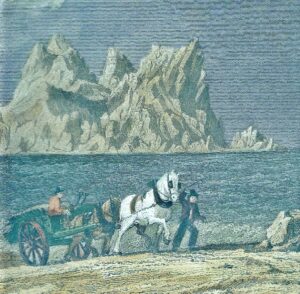
Port Carnow Cove, Cornwall, 1832.
*
Dorothea was standing by the bed. Veryan reached out and took hold of her hand.
‘Why are you holding my hand?’ she asked, startled by this turn of events.
I find I like doing it,’ said Veryan simply. Strange, he thought, I always assumed that a classical education fitted one out for life. I’m beginning to see that it isn’t so at all. ‘What nice long fingers you have.’
*
Once he’s dropped his priggishness, and allows himself to abandon his reserved manner – all sorts of emotions begin to surface …
What I particularly like about Veryan is the naturalness with which he behaves at the end of the book. I hope it’s an ‘Ah!’ moment for my readers, too.
And, I must add, back in January, I learnt that the German translation of Crossing the Tamar, Jenseits des Stromes, had been re-sold to Weltbild, ‘one of the most popular German publishers and largest book retailers’ and will come out in e-books in Spring 2022.
Elizabeth Hawksley
Crossing the Tamar comes out on Monday, 7th June. The link is below.
Please share this page...
This sounds lovely. I do enjoy heroes who don’t seem at all heroic at the start. It’s a tricky balance for the writer, as you say, but it sounds like you’ve managed the switch perfectly. Good luck with the launch!
Thank you, Elizabeth. I’m glad you approve!
I do like a hero who is a bit different from the usual alpha model and it sounds an interesting book. Good luck with it, Elizabeth.
Thank you, Gail. The thing about Alpha Males is that they are fine for fantasy but would you really want one for LIFE? Could you rely on them to remember to take out the rubbish? Or to mop up a child being sick?